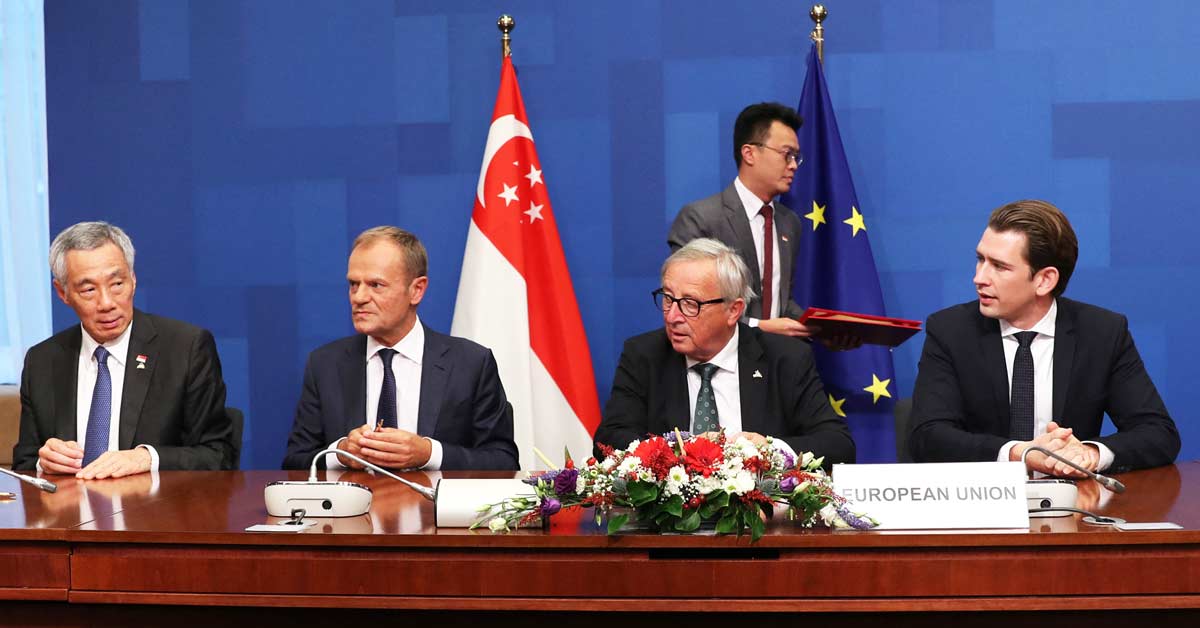European Union (EU) and Singapore senior officials met on 25 February for the 8th Senior Officials’ Meeting to discuss how to build on the current relationship, increase cooperation and address new challenges.
The EU delegation was chaired by Gunnar Wiegand, Managing Director for Asia and the Pacific in the European External Action Service, while Singapore’s side was led by Ng Teck Hean, Deputy Secretary of the Ministry of Foreign Affairs.
The coronavirus pandemic, which has affected all regions and countries, was the centre of the discussion and both parties stressed the importance of cooperation in the fight against the virus and the central role of multilateralism through the COVAX program to distribute vaccines to poorer countries.
COVAX is part of a three-pronged program launched in April 2020 by the World Health Organisation (WHO), the European Commission, and France in response to the pandemic. It brings together governments, global health organisations, manufacturers, scientists, and the private sector, with the aim of providing innovative and equitable access to COVID-19 vaccines.
Singapore is set to receive about 290,000 doses of vaccines out of the more than 32 million doses to be distributed through the program to ASEAN member states, according to the Mission of the European Union to ASEAN’s website.
Officials also discussed how to build on the recently launched EU-ASEAN Strategic Partnership by advancing cooperation between the two blocs in the economic, aviation, and connectivity fields.
The partnership was announced on 1 December, 2020 during the 23rd ASEAN-EU Ministerial Meeting, 43 years after the start of the EU-ASEAN dialog.
In a 30 January, 2021 article by an international magazine covering politics, society, and culture in the Indo-Pacific region, the “ASEAN-EU strategic partnership can best be regarded as a consolidation of the current range of cooperative arrangements and shared objectives, which is broad, commendable, and impressive compared to earlier phases of the relationship.”
“These include economic cooperation and the EU’s ongoing support for ASEAN integration, and cooperation on such issues as the response to COVID-19, climate change and green growth, sustainable development and connectivity, maritime cooperation, and cybersecurity,” the article reads.
Myanmar Situation
The parties also discussed the situation in Myanmar following the 1 February arrest of several of the country’s leaders including President Win Myint and State Counsellor Aung San Suu Kyi by the military.
At the time, Singapore’s Ministry of Foreign Affairs said it was “monitoring the situation closely and hope(d) all parties involved (would) exercise restraint, maintain dialogue, and work towards a positive and peaceful outcome.”
The statement added that the Singapore government hoped the situation would return to normal as soon as possible, adding that “Myanmar is a close friend of Singapore and a key member of ASEAN.”
The EU stressed its willingness to work with Singapore within the ASEAN framework, to resolve in a peaceful way the situation in Myanmar, and to ensure a return to its democratic path, as set out in the EU Foreign Affairs Council Conclusions of 22 February, 2021.
At the time, the EU called for a de-escalation of the crisis and the immediate end to the state of emergency, and the restoration of the legitimate civilian.
The Council’s statement went on to say that while the EU was willing to support dialog with all key stakeholders, it was also ready to adopt restrictive measures targeting those directly responsible for the military coup.
EU-Singapore FTA
The delegations also discussed Singapore's increasingly important role in the EU-ASEAN partnership especially after the EU-Singapore Free Trade Agreement (FTA) entered into force on 21 November, 2019 with the aim to remove most custom duties, and to improve trade for goods like pharmaceuticals, food products, and electronics.
The agreement also aims to stimulate green growth and create opportunities for environmental services.
The EU is Singapore’s second-largest goods trading partner and largest trading partner in services. EU goods exports to the Lion City amounted to US$29 billion in 2019, while imports from Singapore were at US$18 billion for the same year. EU services exports to the city-state stood at US$30 billion in 2018, while services imports were at US$22 billion.
The European bloc and Singapore signed an Investment Protection Agreement on 19 October, 2018 that will enter into force after it has been ratified by all EU member states.
This agreement will replace all existing bilateral investment treaties between EU member states and Singapore, lay down a single set of rules for the protection of all investments between the EU and Singapore, and offer legal certainty to investors on both sides.
Related Articles:
